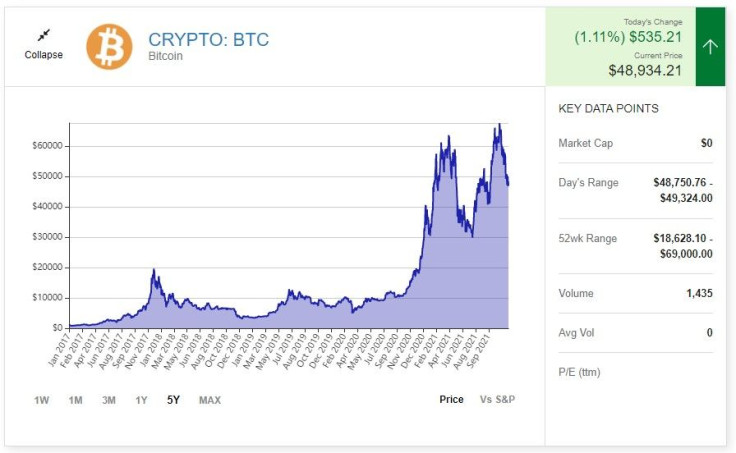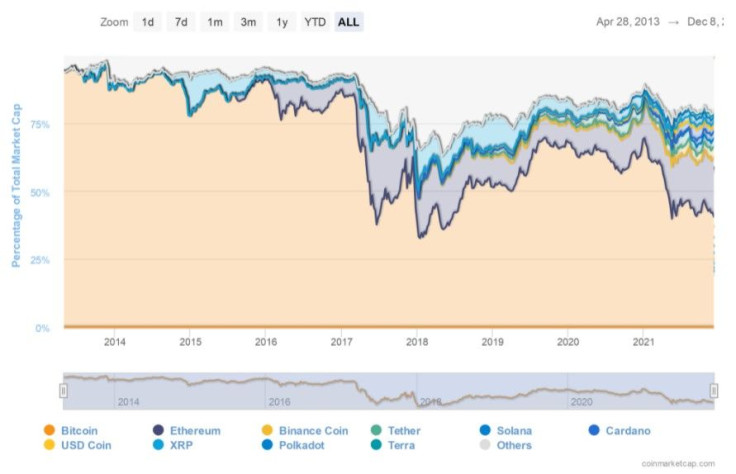3 Top Cryptocurrencies To Buy And Hold Forever
KEY POINTS
- Stability and widespread adoption often matter more than having the best set of technical features.
- These three tokens are leaders in their distinct fields today.
- Investors can buy them at a discount today and hold on for the long run because they are not going away.
The cryptocurrency market has taken a downturn recently. Some investors fear that this could be the start of a correction to rival the enormous plunge of 2017. Back then, leading cryptocurrency Bitcoin ( BTC 1.11% ) fell all the way from $19,500 to $6,700 per coin in the span of seven weeks. That's a 64% drop.
It's very different this time, though. Digital currencies are on their way toward a firm regulatory framework and widespread adoption, so you would be smart to pick up the best cryptocurrencies on big dips -- like the one we see right now.
Sharp corrections tend to sort out the wheat from the chaff, however. There are more than 8,000 digital currencies on the market today, according to Coinmarketcap.com. The vast majority of these tokens will have a short life, leaving early investors holding a bagful of regrets in the end. That's why you must take care to focus on the blockchain tokens with the best chances to survive and thrive in the long run.

Read on to see why Bitcoin, Ethereum ( ETH 4.82% ) , and Polkadot ( DOT 4.81% ) are the top names on that list of long-term winners. These are the ones you should pick up on temporary dips and then hold on with diamond hands.
Strike first, strike hard
I'm not trying to surprise you. The idea is to select the most stable cryptocurrencies from a long-term perspective. These three tokens hold the first-mover advantage in their respective fields, and that's a big deal -- especially for Bitcoin.
Yes, there are many cryptocurrencies that share Bitcoin's vision to provide a digital payment and value storage medium to rival the dollar and the Euro. But the best way to achieve this is to establish one digital coin -- not several dozen options with slightly different design parameters -- which is taken seriously by consumers, retailers, banks, and other money handlers.
For all its technical flaws, Bitcoin was always going to be that cash alternative. This is the first token retailers turn to when considering the future of cryptocurrency payments. It's the one companies like Block and Tesla are putting on their balance sheets, replacing some of their cash reserves. And even though up-and-comers have gained some market share over the last five years, Bitcoin still accounts for 41% of the market capitalization in the cryptocurrency sector as a whole:

So Bitcoin is the most obvious cryptocurrency to buy now and hold forever. But wait -- there's more!
Smart contracts and flexible technology
Money transfer and value storage add up to one of the two leading uses for cryptocurrencies. The other is smart contracts, which use digital tokens to set up and manage an astonishing variety of advanced products and services.
Without smart contracts, you can't have any non-fungible tokens or decentralized finance services. They can add another layer of security to a cryptocurrency transaction or include additional data to the transaction at hand. These contracts may eventually form the basis of next-generation voting systems, manage our healthcare records, or automatically settle our insurance claims.
It's a powerful idea and one that can make you money in the long run. Here, the value in smart contract tokens comes from their advanced functions and real-world utility.
You know the early bird that caught this worm as Ethereum. Projects using this blockchain and its tokens account for the overwhelming majority of all smart contract apps and services today. According to State of the dApps, a site that tracks the market for decentralized applications (dApps), Ethereum-based dApps account for 1,977 out of 2,775 smart contract applications.
A programming platform with a 71% command of the total market is not easily replaced, even if some of Ethereum's rivals offer faster execution and other advantages.
And the Ethereum project isn't exactly sitting still. Developers are always tweaking the blockchain network's code behind the scenes, leading up to the long-expected release of Ethereum 2.0 in early 2022. That upgrade aims to speed up Ethereum's transaction processing, switch to a less energy-draining proof-of-stake ecosystem, and make the whole system more secure. This willingness to acknowledge and fix technical flaws on the fly sets Ethereum up for a long and healthy future in an ever-changing market.
Making big ideas out of smaller parts
And let's not forget about the not-so-secret card up my sleeve. Polkadot is the ninth-largest cryptocurrency by market cap, valued at 5.6% of Ethereum's total value or 2.8% of Bitcoin's. It's a minnow among the whales. Yet, Polkadot's core function holds at least as much real-world utility as Ethereum's, and maybe more.
Polkadot's vision is to connect various blockchain networks to form an interconnected system that is much more powerful than the sum of its parts. You know what I mean. Marshmallows are pretty great on their own. So are graham crackers and chocolate bars. Most people would agree that some warm, gooey S'mores by the fireside are a big improvement over just eating the ingredients separately.
Likewise, apps built on Polkadot can survey the entire cryptocurrency market to find networks that are the best of breed at one specific task, and then combine several of these in an even more powerful end product. For example, if your financial technology idea requires both smart contract features from Ethereum and the value-storing heft of Bitcoin, that's no problem. Throw in user identity management from another specialized network and, I don't know, loan management features from a fourth source, and you'll get a pretty neat digital banking platform. Polkadot makes it easy with extra help from crowdfunding processes and a thriving developer community.
Again, Polkadot is not the only game in town, but it does have a leg up on the competition. In this case, a large and active community may be Polkadot's biggest ace in the hole. This little fish in a big pond may grow up to rub shoulders with giants like Ethereum over the next few years. I wouldn't want to miss out on that evolution, and you should also take a closer look.
This article first appeared in The Motley Fool.
This article represents the opinion of the writer, who may disagree with the “official” recommendation position of a Motley Fool premium advisory service. We’re motley! Questioning an investing thesis – even one of our own – helps us all think critically about investing and make decisions that help us become smarter, happier, and richer.
Anders Bylund owns Bitcoin, Ethereum, Polkadot, and Tesla. The Motley Fool owns and recommends Bitcoin, Block, Inc., Ethereum, and Tesla. The Motley Fool has a disclosure policy.
















